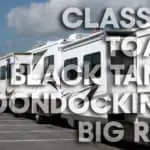RV fire prevention is something every RVer should be aware of. RV fires are a serious concern and impact thousands of RVs every year. According to the U.S. Fire Administration, up to 3,700 RV fires are reported to the fire department each year. There are likely thousands more that don’t get reported. In fact, the National Fire Protection Association (NFPA) estimates up to 20,000 RV fires each year.
While you shouldn’t let fear stop you from RVing, there are steps you can take to protect yourself. Follow these RV fire prevention tips to have a safer camping trip.
Have The Proper RV Fire Prevention Safety Equipment (And Know How to Use It)
One of the best ways to prevent a total loss is to stop fires before they happen or before they spread. The easiest way to do this is to have the proper safety equipment. Here are the supplies every RVer should have for RV fire prevention.
Electrical Management System (EMS)
An EMS is similar to a run-of-the-mill surge protector, but it protects against more than just power surges. One cause of RV fires is low voltage. Low voltage is a common issue at RV parks when the RV electrical systems aren’t up to date.
For example, when multiple RVs run their AC units at the same time, the power draw can result in low voltage. Low voltage causes your appliances to work harder. This added work can cause them to heat up and even catch fire.
The problem with RV surge protectors is that they won’t alert you or intervene when voltage is low (only when it is high as in a power surge). An EMS on the other hand will protect you from high and low voltage as well as a host of other issues.
Hughes Autoformers, Camco, and Progressive Industries all make quality electrical management systems you can count on. If you have a 30 amp RV, you’ll need a 30 amp EMS. If you have a 50 amp RV, you’ll need a 50 amp EMS.
For more details, we’ve got an entire article on RV surge protectors vs EMS.

Heavy Duty Extension Cord
Having the appropriate extension cord and maintaining your cords can also help prevent fires. Every time you hook up you should inspect your RV extension cord for signs of damage. If it is damaged, throw it out and get a new one. It is never fun to spend more money, but a faulty extension cord is a huge safety risk that just isn’t worth it.
Joel and I recently had to replace our extension cord and opted for the Camco RV extension cord. It was a bummer to spend the extra money, but having our RV burn up and possibly kill us would definitely be more of a bummer! If your cord needs upgrading, make sure you get the appropriate 30amp or 50 amp cord to match your RV.
Smoke Detectors
Every RV should also have a smoke detector. Make sure you check it regularly to ensure it is functioning properly. Or if you’re like me, the toaster will set it off every time I use it so I always know my smoke detector is working! It is frustrating, but hey, at least I’ll know the second there is any smoke.
Carbon Monoxide Monitor
Some smoke detectors include carbon monoxide detection. If not, you should purchase a separate carbon monoxide detector. It will alert you of issues like gas leaks which could start an RV fire or kill you.
Fire Extinguishers
Another must-have for RV fire prevention is fire extinguishers. While they won’t prevent a fire, they can stop it before it gets out of hand and destroys your rig.
You should have at least 2 fire extinguishers inside. One in the front near the engine and one in the back where you are sleeping. That way you don’t get stuck on one side of the RV with the extinguisher on the other side. It is also wise to have an additional extinguisher in an unlocked outside compartment. That way you can grab it from outside if need be.
I recommend upgrading your fire extinguisher as soon as you can. In doing research on RVs, I found that dozens of manufacturers had recalled their fire extinguishers. On top of that, they are so small they won’t go very far in the case of a large fire.

Fire Extinguisher Balls
Joel and I also recently purchased some Elide fire extinguisher balls. We placed one by the engine, one by the water heater, and the last behind the panel where all the wiring comes through to the circuit breaker.
The benefit of fire extinguisher balls is that they activate automatically. If we aren’t home or we can’t get the extinguisher in time, we’ll still have protection. When the extinguisher balls are exposed to the flame, they automatically explode out powder to put out the flames.
The Elide fire extinguisher balls are more expensive than other options out there. However, when we did our research, we found that some of the cheaper options don’t even work.
Maintain Your RV to Help With RV Fire Prevention
You can also engage in RV fire prevention by maintaining your RV. Here is a list of things you should regularly inspect to ensure proper functioning. Immediately fix any issues and if you don’t know what you’re doing with electricity, please enlist the help of a professional!
- Electrical systems including all wiring and electrical connections
- 12-volt connections
- Fridge
- Air conditioning units
- Propane tanks and propane detector
- Engine
- Brakes
- Tires
- Power Cords
- Electric heaters
Additional RV Fire Prevention Tips
Here are some additional tips for RV fire prevention that should be on every camper’s mind.
Propane Use Tips
Joel and I always turn off our propane while driving. While not all RVers agree this is necessary, we have decided the benefits outweigh the downsides of turning off the fridge. We simply throw some more ice packs in and run the fridge when we stop in the evenings on long drives.
There are no DOT regulations that require you to have your propane off when driving. Additionally, some manufacturers explicitly say it is okay to drive with your fridge on. However, there are some reasons you might want to consider turning it off.
First, in some tunnels, you’ll be required to have your propane turned off for safety reasons. Pulling over to turn your propane off before going through the tunnel and then back on afterward is a bit of a hassle. You must also turn your propane off when fueling. This can be easy to forget on long drives and increases your risk of fire.
If the electrical ignitor on the fridge tries to light while at a fueling station, an explosion is possible if gas fumes ignite. That ignitor doesn’t attempt to light if the fridge is off. If you never forget to turn your propane off when fueling, you’ll be safe in theory, but how many of us have ever forgotten to do something.
Thankfully, in most modern RV propane systems, there is an excess-flow valve that shuts down the propane flow if the lines are severed and there is no backpressure. However, back in the day, this wasn’t the case. The result was that if lines were severed in an accident, propane could leak out and cause an explosion. Chances are you won’t be able to fill your propane tanks without this valve, so you’re probably safe in that respect. However, I am still of the opinion that the possibility makes it not worth it.
Many experts agree it is safer to drive with the propane off. Each RVer should decide their risk tolerance. If you travel with your fridge on, simply make sure you follow all safety regulations to minimize your risk. You should also maintain your propane tanks and get professional help if you suspect any leaks.

Pay Attention to Where you Park
When you pull into an RV park or a roadside stop after driving, your engine is hot. Parking on top of dry grass or brush can cause a fire right under your RV. Always make sure you aren’t parked on or near anything flammable. This is especially important when traveling in the hot summer months (which is when most RVers are out).
Be Smart About Cooking
Just like when you’re at home, you need to engage in safe cooking habits. Don’t leave cooking food unattended. Another cooking tip is for if you have trouble lighting your stove or oven. If this happens, since RV appliances tend to be finicky, let the gas clear and air out your RV before trying to light it again.
Campfire Safety
When you decide where to build your campfire, make sure it isn’t too close to your RV. Keep any and all flames away from your rig including things like tiki torches. (Which by the way are not an effective mosquito repellent. They do look cool though.) If you cook with charcoal, make sure you maintain it properly as wet charcoal can spontaneously combust.
Have an Escape Plan for When RV Fire Prevention Fails
RV fire prevention isn’t always possible. None of us can ever know when disaster might strike. That is why it is important to have a fire escape plan. Discuss the plan with everyone in your household. Make sure you can exit the RV in at least 2 ways (such as the front door and a window exit.)
Exiting through the window won’t be pretty, especially if you are older. However, it is better than being trapped in a blazing RV. This is another reason why having a fire extinguisher by your bed is so important. It could add precious seconds and give you enough time to escape.
I was unable to find any RV-specific emergency escape ladders currently being produced. A traditional escape ladder would probably be better than nothing although some modifications might be needed. My husband and I are both still young and we rock climb so we would just climb out but I realize that isn’t feasible for many RVers.
If anyone has suggestions or a solution that has worked for you, please share it below!
What RV fire prevention tips do you use? What do you need to add or upgrade?
Leave a comment below with any more life-saving tips




